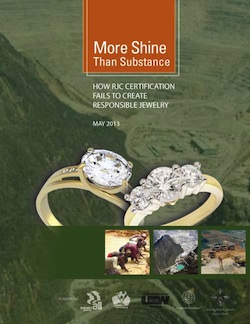Jewelers Risk Tarnishing their Jewelry with ‘Responsible’ Jewellery Council certification
This weekend, jewelers from around the world will gather in Las Vegas for the Jewelry Circular Keystone (JCK) conference, where they will attend jewelry exhibits, discuss the latest industry trends and even see Maroon 5 live.
What does this have to do with us -- and with you?
Jewelry – the wearer and the giver – is supposed to make a person feel good. Through jewelry, we express our personal sense of style, and our affection for each other.
But the gold, diamonds and other mined materials that are used in jewelry manufacturing are too often produced through environmental destruction or human rights abuses -- and that doesn’t make anyone feel good.
As a result, jewelry retailers and manufacturers increasingly find themselves unable to turn a blind eye to their supply chain. That's why 91 retailers have signed the No Dirty Gold campaign’s Golden Rules pledge so far.
While some retailers are taking meaningful steps to clean up their supply chains, there are industry-wide attempts to save face without substantive commitments to genuine social and environmental change.
One such industry attempt is the Responsible Jewellery Council (RJC), which will speak to jewelers at this weekend’s convention in Vegas. An international trade association comprised of jewelry retailers, manufacturers, refiners, mining companies and others, the RJC has created a self-policing certification system it claims will create a responsible supply chain for the jewelry industry.
But as trade unions and NGOs, including Earthworks, have detailed in More Shine Than Substance: How RJC Certification Fails to Create Responsible Jewelry, the RJC has in reality created a system that prioritizes boosting industry image over creating a truly sustainable supply chain for the extraction, processing and selling of diamonds, gold and gems.
This weekend at the conference, hundreds of jewelers interested in making sure their jewels were sourced ethically will attend a panel on how the RJC offers "real world solutions that will enhance their reputations." Some of the problems of the RJC system include:
- Governance: RJC governance excludes impacted communities, labor, and environmental representatives. Civil society’s role is consultative only; final decisions on standard creation and enforcement are controlled by industry.
- Environment: RJC’s standards fail to place concrete targets or limits on water and air pollution such as mercury emissions. It allows unlimited consumption of water and energy. It also allows toxic tailings disposal into lakes and ocean environments, and mining in legally protected areas.
- Mining in conflict zones: RJC allows mining in conflict zones, and fails to require adequate due diligence to ensure that mining in these controversial locations does not contribute to conflict. Companies have also been allowed to mine diamonds in areas where governments are inflicting human rights abuses on local population, such as in the Marange diamond mining region in Zimbabwe.
- Weak on labor: RJC standards do little to protect workers’ rights to join trade unions, do not require RJC members to provide a ‘living wage’, contain weak grievance provisions, enable children as young as 14 to be employed by RJC members if allowed by national law, and allow RJC members to do business with suppliers and others who use forced or child labor
Over the past 5 years, many jewelry retailers have turned to RJC as a response to brand risks they may face as a result of campaigns such as No Dirty Gold, or conflict diamonds.
But as the report’s 100 + page analysis describes, the RJC certification system does not do enough to address the concerns raised by these campaigns – or to meet the commitments made by retailers. Ethical jewelers must do more – and must urge RJC to do so as well. If not, they risk misleading the public and consumers – and hurting their reputations in the process.
Tagged with: rjc, mining, jewelry, gold, diamond
comments powered by Disqus
Follow Earthworks